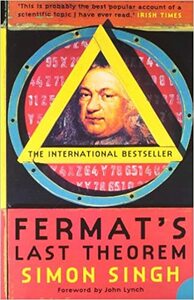You need to sign in or sign up before continuing.
Take a photo of a barcode or cover
lovely. read in four or five days. as with most or all pop math books, the sections focusing on contemporary research can't help but be vague – but the intrigue and verve of it all more than make up for it. (i was very moved by the bits on Nada's "birthday present".) i remember one of my high school teachers recommending this in class, and i wish i had read it back then.
never been so exited to read about a bloke spending 7 years secretly working on a mathematical proof
challenging
inspiring
medium-paced
I remember first hearing about Fermat's Last Theorem and becoming fascinated. Then I read on Wikipedia that a proof had been found, but it was so complex that only other mathematicians could understand it.
Amazingly, this book breaks down the whole saga into layman's terms. It's not dumbed-down, just really well-explained (going back to Pythagoras).
Is there such a genre as math-writing? If so, this book should win an award.
If you're interested in Fermat's Last Theorem, you've also got to check out Tom Stoppard's "Arcadia" — preferably the L.A. Theatre Works audio version.
Amazingly, this book breaks down the whole saga into layman's terms. It's not dumbed-down, just really well-explained (going back to Pythagoras).
Is there such a genre as math-writing? If so, this book should win an award.
If you're interested in Fermat's Last Theorem, you've also got to check out Tom Stoppard's "Arcadia" — preferably the L.A. Theatre Works audio version.
informative
fast-paced
Moderate: Gun violence, Mental illness, Suicidal thoughts, Suicide, Violence, Suicide attempt
Where do I even start!
Fermat’s Last Theorem is one of the only nonfiction books I’ve ever read that I’ve been totally gripped by. It’s written so fantastically, any amateur mathematician will be immediately interested.
FLT covers literally thousands of years of history, from Pythagoras’ cult BC and the library of Alexandria to Fermat to Euler and then right the way up to Wiles’ proof in 1997 after 350 years of mathematicians desperately trying to solve Fermat’s theorem.
I was immediately fascinated by the number theory of this book. The way of breaking down what we take to be true, into properties and families that most brains will never consider, is something that fascinates me, and has done since I was little. I’ve always been categorising numbers in my head, since I was maybe 5 and used to always count in “even even numbers” (which I know now to be powers of 2). The absolutely absurd yet vital practices of Pythagoras were so brilliantly written, and I really enjoyed learning about number theory and the semicircle of Pythagoras.
Moving on towards the middle of the book, I was so gripped by the way ideas developed. I’ve never considered in so much detail how mathematical collaborations form and how they propel maths in the way they do. I enjoyed reading extracts from letters between prolific mathematicians. I really loved reading about the personal histories of dozens of mathematicians and how their studies brought them to Fermat’s Last Theorem. I found Germain to be a particularly fascinating character and I can’t wait to read more on her.
Towards the end of the book, I knew I had no hope of understanding the maths, but I found the Taniyama-Shimura conjecture really interesting to read about. Taniyama’a death was tragic, but the way two seemingly separate fields of mathematics seemed fundamentally linked, and then turned out to be the solution to fermat’s theorem, is incredible to me, and a real testament to the power of collaboration in mathematics.
And then Wiles himself. I admit I found myself relating to his reclusive ways a bit, and his total dedication, bordering on obsession, was what really made this book special. That so many ideas can collide to allow one man, working alone for in total over 8 years, to solve a 350-year-old problem, is amazing to me. And I can’t wait to become more advanced so I can understand the maths that got him here.
I’m now absolutely itching to know how Fermat was able to solve it without the techniques of modern maths. Maybe we’ll never know, but Wiles pulled an incredible feat and it’s made me unbelievably excited about maths and research and the future.
Fermat’s Last Theorem is one of the only nonfiction books I’ve ever read that I’ve been totally gripped by. It’s written so fantastically, any amateur mathematician will be immediately interested.
FLT covers literally thousands of years of history, from Pythagoras’ cult BC and the library of Alexandria to Fermat to Euler and then right the way up to Wiles’ proof in 1997 after 350 years of mathematicians desperately trying to solve Fermat’s theorem.
I was immediately fascinated by the number theory of this book. The way of breaking down what we take to be true, into properties and families that most brains will never consider, is something that fascinates me, and has done since I was little. I’ve always been categorising numbers in my head, since I was maybe 5 and used to always count in “even even numbers” (which I know now to be powers of 2). The absolutely absurd yet vital practices of Pythagoras were so brilliantly written, and I really enjoyed learning about number theory and the semicircle of Pythagoras.
Moving on towards the middle of the book, I was so gripped by the way ideas developed. I’ve never considered in so much detail how mathematical collaborations form and how they propel maths in the way they do. I enjoyed reading extracts from letters between prolific mathematicians. I really loved reading about the personal histories of dozens of mathematicians and how their studies brought them to Fermat’s Last Theorem. I found Germain to be a particularly fascinating character and I can’t wait to read more on her.
Towards the end of the book, I knew I had no hope of understanding the maths, but I found the Taniyama-Shimura conjecture really interesting to read about. Taniyama’a death was tragic, but the way two seemingly separate fields of mathematics seemed fundamentally linked, and then turned out to be the solution to fermat’s theorem, is incredible to me, and a real testament to the power of collaboration in mathematics.
And then Wiles himself. I admit I found myself relating to his reclusive ways a bit, and his total dedication, bordering on obsession, was what really made this book special. That so many ideas can collide to allow one man, working alone for in total over 8 years, to solve a 350-year-old problem, is amazing to me. And I can’t wait to become more advanced so I can understand the maths that got him here.
I’m now absolutely itching to know how Fermat was able to solve it without the techniques of modern maths. Maybe we’ll never know, but Wiles pulled an incredible feat and it’s made me unbelievably excited about maths and research and the future.
informative
inspiring
reflective
fast-paced
hopeful
informative
inspiring
medium-paced
informative
informative
inspiring



